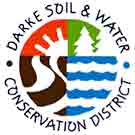|
|
 |
|
The
views expressed
on this page are soley those of the author and do not
necessarily
represent the views of County News Online
|
 |
We All Play a
Role in Agricultural Pollution Abatement
by Janell Weiss and Jared Coppess
Water quality has long been a concern, and recent events in Lake Erie,
Grand Lake St. Mary’s, Buckeye Lake and the Gulf of Mexico have brought
that concern to the front of people’s minds. Earlier this month, the
Governor signed Senate Bill 1 (SB1) which aims to mitigate harmful
algal blooms in the Western Lake Erie Basin. Amid new legislation and
increased interest in and scrutiny of agriculture, the Darke Soil and
Water Conservation District (SWCD) will release a series of monthly
articles on agricultural topics. Be on the lookout for future columns
from Darke SWCD staff on SB1, manure application setbacks, manure
storage and stockpiling, cover crops and other related topics. All
articles will be released to local media and available online at
www.darkeswcd.com.
Darke SWCD staff would like to engage the county in a conversation on
environmental stewardship. This series of articles will provide farmers
with information to help them protect water quality. Additionally
non-farming community members can learn what farmers are doing and can
do to protect water quality in our lakes, rivers and streams. This
month’s article focuses on the role we all play in agricultural
pollution abatement.
Darke SWCD staff encourages and welcomes the public to participate in
the Ohio agricultural pollution abatement program. This program depends
upon public participation. Darke SWCD has the authority and
responsibility to investigate and seek the resolution of all complaints
regarding agricultural or silvicultural pollution in the county. Please
contact the Darke SWCD at 937-548-1752 if you see a manure spill, are
concerned about an imminent manure spill, or have questions about the
pollution abatement program.
When submitting a complaint, you may choose to provide your name or
submit the complaint anonymously. Complaints may be submitted orally,
over the phone, in person, or in writing. Darke SWCD staff will ask you
to describe your concern, to provide location information, and to
detail what waters of the state are impacted and any other information
that may aid the investigation. If you choose to disclose your name and
contact information, staff will ask what follow-up you would like to
receive.
Darke SWCD investigates every agricultural pollution complaint
received. During an investigation, Darke SWCD staff will attempt to
determine if waters of the state are being degraded by manure or other
agricultural wastes. If waters of the state are impacted, Darke SWCD
staff will contact and coordinate with other government agencies that
regulate pollution of surface water. The goal of Darke SWCD is to seek
a voluntary, cooperative solution with the responsible party. Darke
SWCD will recommend and work with producers to establish corrective
actions, both temporary and permanent.
When a pollution complaint relates to a manure field application or
stockpile, staff will review what agricultural best management
practices (BMPs) were followed. These BMPs relate to field conditions
and weather forecasts at the time of a manure application and manure
application rates and setbacks. Agricultural producers, especially
livestock producers, need to be familiar with the recommended BMPs.
Please contact Darke SWCD if you need information on BMPs for handling
manure.
The participation of the public in this program is crucial to its
success. If you see a concern, contact Darke SWCD so staff can
investigate the issue. Remember the choice of anonymity is available
and will be honored, but it is your responsibility to request
anonymity. Darke SWCD is committed to protecting the waters of the
state, and part of that commitment is public outreach and education.
Throughout this year, Darke SWCD will be releasing a series of timely
articles related to agricultural and manure management BMPs.
One final thing to think about, if you see something that causes
concern, please participate in the agricultural pollution abatement
program by calling Darke SWCD at 937-548-1752 and giving the
appropriate details. Let’s all commit to protecting and improving
Ohio’s water quality.
|
|
|
|

